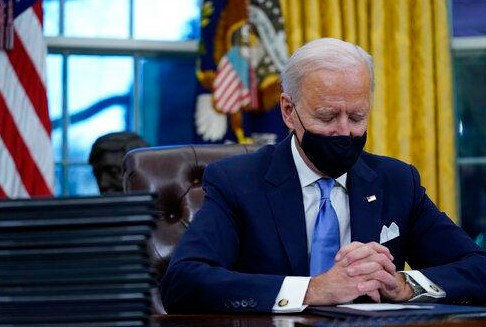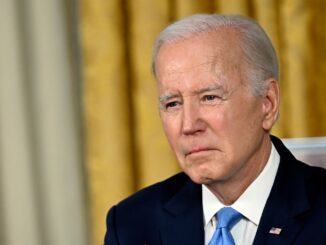
Upon assuming office Wednesday, President Joe Biden swiftly signed several executive orders, effectively unwinding a ream of energy policies instituted by the Trump administration.
Biden made repeated overtures during his campaign to fight climate change, calling the rapid rise in greenhouse gas emissions a crisis facing the nation and world. Part of his ambitious plans to slash carbon dioxide levels involve weaning the country off of fossil fuels.
It’s a transition many in Wyoming consider lethal to the state’s economy.
Wyoming produces more coal than any other state, hosting some of the world’s largest coal mines. The state also ranks among the top oil and natural gas producers on federal land. When it comes to total energy expenditures per capita, Wyoming is first in the country.
Yet several of the executive orders signed into law last week could undermine Wyoming’s heavy reliance on coal, oil and natural gas production on federal land.
Among the dizzying number of orders rolled out on Wednesday, the Star-Tribune analyzed which could impact Wyoming most.
Regulatory rollback, reversed
In one particularly potent executive order, Biden ordered nearly all executive departments and agencies to review regulations and other actions introduced by former President Donald Trump. Biden wants to ensure all federal policies protect public health, promote environmental justice and reduce greenhouse gas emissions, according to the order.
In contrast, most of the rules and regulations issued by the Trump administration sought to “streamline” regulatory processes or “lift regulatory burdens” on energy companies to promote more economic development and energy independence. Several lawmakers and state officials in Wyoming have noted their preference for state primary over environmental protections. Many here supported Trump’s changes, seeing them as a way to expedite energy development.
Randall Luthi, Gov. Mark Gordon’s energy adviser, called the actions taken by Biden in his first day in office “extremely disappointing.” But for now, much is still unknown, he said. The governor’s office will be watching what rules may be on the chopping block.
“We knew every decision would likely be made through the climate lens, but it appears to be even broader than what we thought it would be,” he noted.
Federal agencies will be tasked with interrogating amendments to sage grouse protection plans, measures to relax methane emission, revisions to the nation’s landmark environmental act, among at least 101 other regulations. That said, Biden’s order does not immediately nullify all the rules and regulations installed by the Trump administration. Undoing Trump’s legacy will likely take time.
“This announcement shows President Biden is making good on his campaign promises to protect America’s land and water for future generations, address climate change head-on, and erase the Trump administration’s horrific environmental actions,” Jennifer Rokala, executive director for the Center for Western Priorities, said in response to the executive order requiring federal agencies to review Trump’s rules. “The list of policies to be reviewed is rightfully long.”
Pipeline dreams dashed
As part of the same executive order, Biden took steps to revoke a permit needed to continue construction of the Keystone XL pipeline, a highly contested, 1,700-mile pipeline intended to transport some 800,000 barrels of crude a day between the Canadian province of Alberta and the Texas Gulf Coast.
“We’re pretty disappointed in the cancellation of the Keystone XL pipeline,” said Ryan McConnaughey, communications director of the Petroleum Association of Wyoming. “Pipelines have been proven to be the most environmentally sound means of transporting those products. And the cancellation comes when we’re trying to get the economy back going. This will really hamper our ability to recover the economy.”
Energy companies lambasted the new administration, calling the move reckless and detrimental to preserving the country’s energy independence.
Steve Degenfelder, land manager for Kirkwood Oil and Gas LLC, said the decision would directly impact the independent company he works for in Casper.
“The Keystone XL pipeline was going to increase pipeline space out of Canada and North Dakota,” he said. “Without that pipeline, and possibly even without the Dakota Access pipeline, we are back to where we are right now, which is a lack of pipeline space to accommodate supply.”
“It’s whoever wants to sell their crude oil for the cheapest,” Degenfelder said.
Instead of trading off of West Texas Intermediate, a U.S. benchmark for oil, much of western Wyoming crude competes against Western Canadian Select, he said. In Wyoming, transportation costs and a lack of pipeline infrastructure can mean less profit per barrel.



